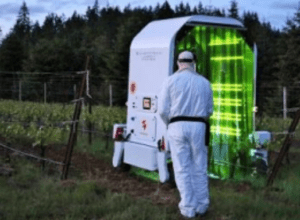 May 27, 2021 (Turner, OR) – Willamette Valley Vineyards, a leading Pinot Noir producer in Oregon, has teamed up with Saga Robotics, Cornell University and USDA scientists at Oregon State University to introduce new ultraviolet light technology in its vineyards to combat powdery mildew.
May 27, 2021 (Turner, OR) – Willamette Valley Vineyards, a leading Pinot Noir producer in Oregon, has teamed up with Saga Robotics, Cornell University and USDA scientists at Oregon State University to introduce new ultraviolet light technology in its vineyards to combat powdery mildew.
Using an autonomous robot to apply a special band of ultraviolet light, UV-C, treatment to the vines, Willamette will be the first farmer to prevent powdery mildew from damaging its prized wine grapes by replacing its use of organic sulfur with sustainable UV-C light.
The UV-C light treatment must be delivered in high doses at low speeds and at night to circumvent the natural defenses of powdery mildews to UV. The low speeds and nighttime operation, make human-controlled tractor applications inefficient and costly. Saga Robotics developed an electric powered robot for chemical-free, autonomous protection of grapevines.
Powdery mildew is one of the most widespread and easily recognized plant diseases — from home gardens to just about every agriculture operation across the globe. In the U.S. alone, more than 100 million pounds of chemical fungicides are used each year to combat the disease. The major pathogen, powdery mildew, has developed resistance to many modern fungicides requiring an ever-increasing rotation of chemicals. If not suppressed, powdery mildew can reduce crop yield by up to 95% (UC Davis) and degrade wine quality by increasing berry acidity, reducing anthocyanins, and leading to cryptic development of off flavors.
Last year, the winery installed UV-C light in its HVAC systems to combat the Coronavirus with technology developed by NASA for the International Space Station. Willamette Valley Vineyards Founder/CEO Jim Bernau’s research into the technology led him to the innovative work at Cornell University and their collaborators at USDA-ARS, Oregon State and Washington State Universities. He offered the winery’s resources and purchased a unit to further develop the technology and prove its effectiveness in commercial practice.
“The pandemic and the need to kill the coronavirus led us to study UV-C light,” Bernau said. “We learned it can be used to kill viruses and other things like powdery mildew — naturally, without the use of chemicals. We see this as a remarkable opportunity for our industry to grow high quality wine grapes and do it in a very natural, sustainable way.”
David Markel, Research and Development Manager at Willamette Valley Vineyards and Alex Wong, Graduate Student Oregon State University, assembled the latest model of the robot, Thorvald, shipped from Norway by Saga Robotics to run in Willamette Valley Vineyards’ estate vineyards.
Last summer, two prototypes of the grape robot were deployed at vineyards near Cornell University in the Finger Lakes region of New York.
This new UV-C light technology could greatly reduce global agricultural use of fungicides if farmers adopt this technology.











